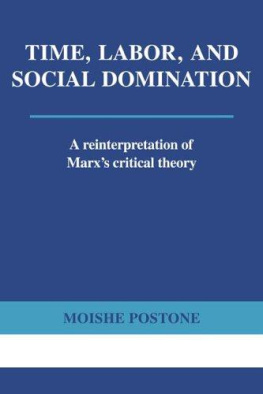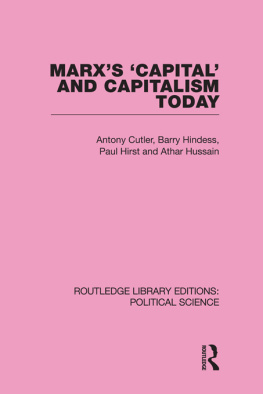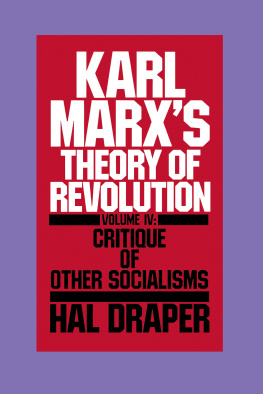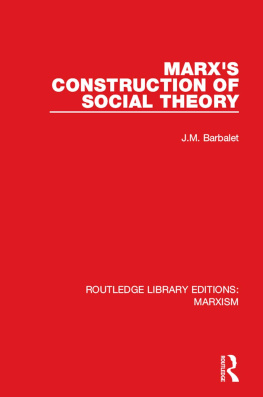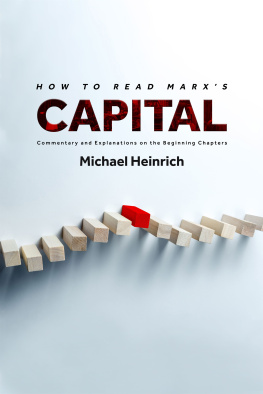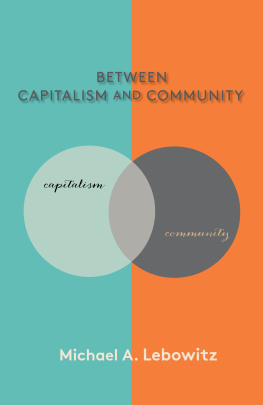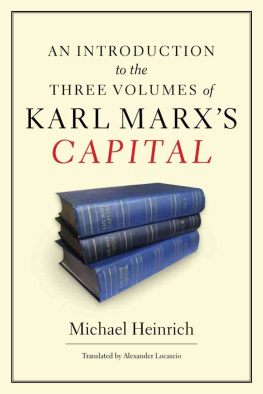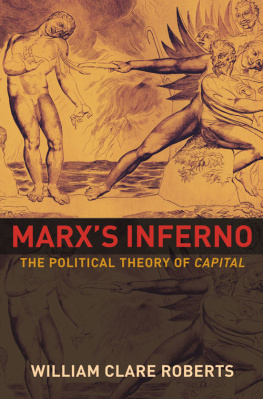Time, Labor, and Social Domination
Moishe Postone
- Acknowledgments
This book had its origins some years ago, when, as a graduate student, I first came across Marxs Grundrisse. At the time, I was struck by its far-reaching implications, which suggested to me a fundamental reinterpretation of Marxs mature critical social theory, one that broke with some central assumptions of traditional Marxism. I also thought such a reinterpretation could provide the point of departure for a powerful and sophisticated analysis of modern society.
In my attempt to re-appropriate Marxs theory, I have had the good fortune to receive considerable intellectual and moral support from many people. I was strongly encouraged to begin this project by two of my teachers at the University of Chicago, Gerhard Meyer and Leonard Krieger. I further developed my ideas during an extended stay in Frankfurt am Main, where I benefited greatly from the general theoretical atmosphere as well as from many intensive discussions with friends there. I owe special thanks to Barbara Brick, Dan Diner, and Wolfram Wolfer-Melior, who provided me with important personal and intellectual support and helped me refine my approach to many of the issues raised in this book. I would also like to thank Klaus Bergmann, Helmut Reinicke, and Peter Schmitt-Egner for many illuminating conversations. I completed an earlier version of this work as a dissertation for Fachbereich Gesellschaftswissenschaften at the J. W. Goethe-Universitat in Frankfurt, having received valuable guidance and encouragement from Iring Fetscher, and very useful and extensive critical comments from Heinz Steinert, Albrecht Wellmer, and Jeremy Gaines, as wells Gerhard Brandt and Jrgen Ritsert. Through the Canada Council, I received generous financial assistance from the Deutsche Akademischer Austauschdienst during my stay in Frankfurt.
The Center for Psychosocial Studies in Chicago subsequently provided me with a postdoctoral fellowship, as well as a lively and supportive intellectual environment, which enabled me to begin reworking my dissertation into this volume. I was afforded the rare opportunity of presenting my work in a series of seminars to a group of intellectually and academically diverse fellows; their reactions were very stimulating. I am grateful to Ed LiPuma, John Lucy, Beth Mertz, Lee Schlesinger, Barney Weissbourd, and Jim Wertsch, whose comment sand criticisms helped me clarify my ideas further. I am especially thankful to Craig Calhoun and Ben Lee, who took the time to read carefully both the original manuscript and the revised version, and whose critical suggestions have been very helpful.
I completed this manuscript at the University of Chicago, and continue to benefit from the exciting, open, and intellectually rigorous climate created by my colleagues and students.
I owe a great deal to the following friends for their engagement with my work and, more generally, for their intellectual and moral support: Andrew Arato, Leora Auslander, Ike Balbus, Seyla Benhabib, Fernando Coronil, Norma Field, Harry Harootunian, Martin Jay, Bob Jessop, Tom McCarthy, Gyrgy Markus,Rafael Sanchez, George Steinmetz, Sharon Stephens, as well as John Boyer, Jean Cohen, Bert Cohler, Jean Comaroff, John Comaroff, Michael Geyer, Gail Kligman, Terry Shtob, and Betsy Traube. I also thank Fred Block, Cornelius Castoriadis, Geoff Eley, Don Levine, Bertell Ollman, and Terry Turner for their helpful comments.
Special thanks are due to my brother, Norman Postone, who accompanied and supported this project since its inception. I am particularly grateful to Patrick Murray,who read more versions of the manuscript than I care to remember,and whose comments have been both very helpful and generous. I have learned a great deal from our ongoing conversations.
Emily Loose, formerly of Cambridge University Press, responded very positively to this work and has been extremely helpful in preparing it for publication. Her many astute comments and recommendations contributed greatly to the finished manuscript. I thank Elvia Alvarez, Diane New,and Kitty Pucci for typing the various stages of the manuscript, as well as for their general helpfulness, and Ted Byfield for editing this volume. And I would also like to thank Anjali Fedson, Bronwyn McFarland, and Mike Reay for their help in proofreading and in preparing the index.
Finally, I wish to express my very deep gratitude to my wife, Margret Nickels. She has, for many years and in many ways, been intellectually and emotionally central to this project.
- Part I: A Critique of Traditional Marxism
- 1. Rethinking Marxs Critique of Capitalism
- Introduction
In this work I shall undertake a fundamental reinterpretation of Marx's mature critical theory in order to re-conceptualize the nature of capitalist society. Marx's analysis of the social relations and forms of domination that characterize capitalist society can be most fruitfully reinterpreted by rethinking the central categories of his critique of political economy. Toward that end, I shall seek to develop concepts that fulfill two criteria: First, they should grasp the essential character and historical development of modern society; and second, they should overcome the familiar theoretical dichotomies of structure and action, meaning and material life. On the basis of this approach, I shall try to reformulate the relation of Marxian theory to the current discourses of social and political theory in a way that has theoretical significance today, and provides a basic critique of traditional Marxist theories and of what was called "actually existing socialism." In doing so, I hope to lay the foundation for a different, more powerful critical analysis of the capitalist social formation, one adequate to the late twentieth century.
I shall attempt to develop such an understanding of capitalism by separating conceptually, on the basis of Marx's analysis, the fundamental core of capitalism from its nineteenth-century forms. Doing so, however, calls into question many basic presuppositions of traditional Marxist interpretations; for example, I do not analyze capitalism primarily in terms of private ownership of the means of production, or in terms of the market. Rather, as will become clear, I conceptualize capitalism in terms of a historically specific form of social interdependence with an impersonal and seemingly objective character. This form of interdependence is effected by historically unique forms of social relations that are constituted by determinate forms of social practice and, yet, become quasi-independent of the people engaged in these practices. The result is a new, increasingly abstract form of social domination one that subjects people to impersonal structural imperatives and constraints that cannot be adequately grasped in terms of concrete domination (e.g., personal or group domination),and that generates an ongoing historical dynamic. In re-conceptualizing the social relations and forms of domination that characterize capitalism, I shall attempt to provide the basis for a theory of practice capable of analyzing the systemic characteristics of modern society, such as its historically dynamic character, its processes of rationalization, its particular form of economic "growth," and its determinate mode of producing.
This reinterpretation treats Marx's theory of capitalism less as a theory of forms of exploitation and domination within modern society, and more as a critical social theory of the nature of modernity itself. Modernity is not an evolutionary stage toward which all societies evolve, but a specific form of social life that originated in western Europe and has developed into a complex global system. Although modernity has taken different forms in different countries and areas, my concern is not to examine those differences but to explore theoretically the nature of modernity per se. Within the framework of a non-evolutionary approach, such an exploration must explain modernity's characteristic features with reference to historically specific social forms. I argue that Marx's analysis of the putative fundamental social forms that structure capitalism the commodity and capital provides an excellent point of departure for an attempt to ground socially the systemic characteristics of modernity and indicate that modern society can be fundamentally transformed. Moreover, such an approach incapable of systematically elucidating those features of modern society that,within the framework of theories of linear progress or evolutionary historical development, can seem anomalous: notable are the ongoing production of poverty in the midst of plenty, and the degree to which important aspects of modern life have been shaped by, and become subject to the imperatives of, abstract impersonal forces even as the possibility for collective control over the circumstances of social life has increased greatly.
Next page
